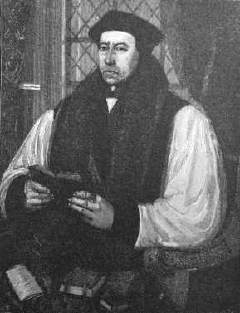The Book of Common Prayer
One of the finest prose styles of the Tudor period was that of Thomas Cranmer (1487-1556), who had been appointed* Archbishop of Canterbury by Henry VIII*, and who was the voice behind the Book of Common Prayer.
Henry had encouraged the translation of the Bible into English, but it was not until the reign of Edward VI* that the Book of Common Prayer was published. It was vilified from both sides--those who wanted the Latin liturgy to remain, and those who felt that it did not go far enough towards Protestantism*.
Cranmer's death
Under the reign of Mary Tudor, Cranmer was accused of high treason, although his life was initially spared. He was later tried for heresy; although he initially recanted, he eventually renounced his confession and was burned at the stake at Oxford on March 21, 1556.
Why is Cranmer's right hand in the fire? At the stake, Cranmer was asked again to recant; instead he thrust the hand that signed his first recantation into the fire.
The prose of the prayer book.*
Footnotes
-
Good advice
Cranmer was appointed when he suggested to Henry that he consult the European universities for favourable opinions about his divorce, advice which gained him the gratitude of the king. Cranmer accepted the appointment, though with some reluctance, since earlier in the same year he had met and secretly married Margaret Osiander, niece of a Lutheran reformer, despite the prohibition of clerical marriage.
-
Marriage after marriage . . .
Cranmer played a role in several of the marriages of Henry VIII. In 1533 Cranmer annulled Henry's marriage to Catherine of Aragon to enable the king to wed Anne Boleyn; three years later he also annulled their marriage. Cranmer subsequently performed the marriage and divorce of Henry and Anne of Cleves.
-
Cranmer and Edward VI
As well as being marriage/divorce counsellor to Henry VIII, Cranmer was an influential counsellor to Edward VI, under whom he developed a more Protestant outlook. He was largely responsible for the abolition of old church customs and the destruction of church furnishings, images and relics during Edward's reign.
-
Via media
In his own way, by avoiding extremes, Cranmer anticipated the "via media"--middle way--of Elizabeth.
-
The prose of the Prayer Book
O God, from whom all holy desires, all good counsels, and all just works do proceed; give unto thy servants that peace which the world cannot give, that both our hearts may be set to obey thy commandments, and also that by thee, we being defended from the fear of our enemies, may pass our time in rest and quietness, through the merits of Jesus Christ, our Saviour.
(From the service of Evening Prayer)
Priest: Lift up your hearts.
Answer: We lift them up unto the Lord.
Priest: Let us give thanks unto our Lord God.
Answer: It is meet and right so to do.
Priest: It is very meet, right, and our bounden duty, that we should at all times, and in all places give thanks to thee, O Lord, holy Father, Almighty, everlasting God.
(From the Communion service)The Collect (prayer) for the last Sunday before Advent reminded housewives to stir up their Christmas cakes:
Stir up we beseech thee, O Lord, the wills of thy faithful people, that they, plenteously bringing forth the fruit of good works, may of thee be plenteously rewarded.
